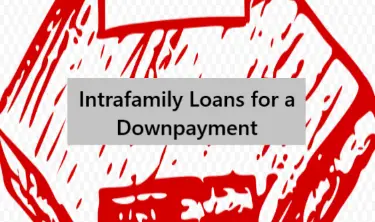Intrafamily Loans Tax Implications
If you have oversaved for retirement, you might consider giving your kids or grandkids a loan for a downpayment on a house. The tax implications of these intrafamily loans are important to understand.
With the large increase in home prices in the last few years and relatively high-interest rates, your kids may have a good job and decent earnings but still not have enough for a downpayment. If your ultimate goal is to leave money behind for the family, why not start now with an intrafamily loan?
What is an Intrafamily Loan?
An intrafamily loan is a formal process in which you become the bank, and your family member takes a loan from you. You can gift money to your kids or grandkids, or you can set up a loan with the intention that they pay you back with interest. You can also forgive the interest, but we will address that below.
An intrafamily loan requires a formal document. Charge a minimal amount of interest, set up the terms correctly (interest only, amortized payments, or accrued interest), and accurately document the terms and conditions of the loan.
Tax Consequences of Intrafamily Loans
The tax consequences of intrafamily loans are relatively straightforward but should be followed to avoid issues with the IRS. The IRS will tax you with imputed interest if you charge interest rates below market. You could get hit with a phantom tax bill even if you don’t collect any interest.
There are a few exceptions, such as:
- De minimis exception for loans less than $10k (and a non-income producing asset)
- Loan less than $100k limits the interest annually to the net investment income of the borrower
For loans smaller than 10k, you don’t need to bother with paperwork, but the 100k exception needs to be fully documented and executed. There are additional tax implications for these, so do research if you plan one of these exemptions.
Tips for Intrafamily Loans
Get in Writing
It is important to keep this above board if the IRS ever comes sniffing around. It prevents the loan from being treated like a gift and allows you to take a short-term capital loss if your ingrate kids renege on the deal.
Use Applicable Federal Rates
Applicable federate rates are published monthly and found on the IRS Website.
Gift Tax Exclusion
The federal gift tax exclusion is currently close to $13M per person, but this is scheduled to be cut in half in 2026 when TCJA expires. Yearly gift tax exclusion amounts are $18k per individual in 2024.
Other Uses for Intrafamily Loans
Aside from being used as a downpayment on a residence, intrafamily loans may be used to buy shares of a family business, pay down debt, or invest in businesses or assets.
Short-, Mid-, and Long-term Rates
Short is less than three years, and long-term rates apply to loans with terms greater than nine years. Between 3-9 years, you use the mid-term rate.
Secure Loans
If you secure the loan (with real estate), it may be protected from creditors or divorce and may permit the borrower to deduct the interest expense.
Repercussions of Loan Forgiveness
You may still be required to recognize the interest as income if you give a loan forgiveness. Suppose the loan forgiveness is at the lender’s discretion. In that case, you may forgive up to the yearly gift tax exclusion amount ($18k per individual in 2024) and avoid the loan being considered a taxable gift.
Refinance if AFR is Low
You may consider refinancing the loan if there is a significant decrease in the AFR.
Other Advantages
There are additional advantages, such as decreased closing costs and no credit checks.
Conclusion
Intrafamily loans are a tax-efficient way to transfer wealth, but the ability to give with warm hands is more important than that. If you can help your kids or grandkids now rather than when you die, what a nice gift!
Given increases in housing prices and interest rates, loaning your kids a downpayment via an intrafamily loan makes a lot of sense. They can also be a very attractive alternative to your bond portfolio.

